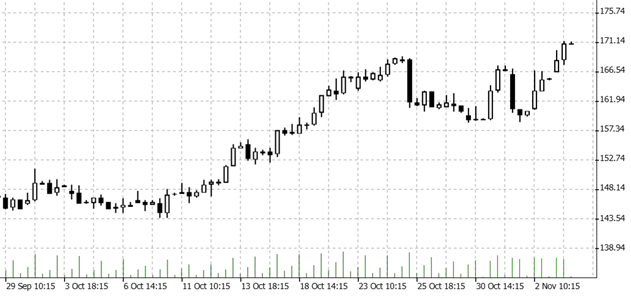

06.11.2023 – Arabica coffee has just risen to its highest level for over four months. No wonder, as stocks are emptying. We shed light on the background.
A small bull run for Arabica: the past few days have seen an upward trend, here is the four-hour chart.

Source: Bernstein Bank GmbH
And this is the reason for the recent price increase: according to a statement on Friday, the stocks of Arabica managed by the Intercontinental Exchange (ICE) have fallen to a 24-year low of around 360,000 bags. It also said that there were currently no new goods waiting to be added to the warehouses. Reuters explained that the low level can be explained by the fact that the physical market is valuing the commodity higher than the prices achieved on the ICE. In other words, suppliers are expecting even higher prices.
Brazil and Colombia
John Goodwin, Senior Commodity Analyst at ArrowStream, recently told Bloomberg that falling stocks are another factor behind the bullish outlook for the coffee variety. Despite recent rainfall in Brazil, which is positive for the plants, it is far too early to focus solely on the rain. Because there are “still too many question marks out of Brazil and Colombia for me to believe this recent rally is already over.”
These are some of the question marks: The logistics situation in Brazil is anything but satisfactory. In addition, the relatively strong real against the dollar has recently dampened the export mood of producers. Cecafe, the Brazilian exporters’ association, reported in mid-October that exports of Arabica from Brazil had fallen by a fifth year-on-year. The 2.4 million bags shipped were the lowest level for this month in six years. Brazil is the world’s largest producer of Arabica. Colombia also had to contend with weather problems and insufficient pollination of the plants.
Is the boom sustainable?
However, after a heatwave in recent weeks, the rain is now returning in Brazil. Which promises a better harvest. The weather service Maxar Technologies recently announced that the growing areas in Brazil will receive moderate rain this week. Somar Meteorologia had previously stated that the Minas Gerais region in Brazil was receiving 130 percent of the historical rainfall level. Around a third of Brazil’s coffee is grown there. The World Bank is also counting on falling prices in the medium term: It expects supply to increase in Brazil, Vietnam and Colombia in the near 2024.
It should be noted that demand should not be overlooked. If the world slips into a deep and prolonged recession, this will also have a negative impact on the price of coffee. If the economy picks up again, demand will increase. We look forward to seeing how things develop and wish you successful trades and investments!
_________________________________________________________________________________________________________________________________
The content of this publication is for general information purposes only. In this context, it is neither an individual investment recommendation or advice nor an offer to purchase or sell securities or other financial products. The content in question and all the information contained therein do not in any way replace individual investor- or investment-oriented advice. No reliable forecast or indication for the future is possible with respect to any presentation or information on the present or past performance of the relevant underlying assets. All information and data presented in this publication are based on reliable sources. However, Bernstein Bank does not guarantee that the information and data contained in this publication is up-to-date, correct and complete. Securities traded on the financial markets are subject to price fluctuations. A contract for difference (CFD) is also a financial instrument with leverage effect. Against this backdrop, CFD trading involves a high risk up to the point of total loss and may not be suitable for all investors. Therefore, make sure that you have fully understood all the correlating risks. If necessary, ask for independent advice. CFDs are complex instruments and are associated with the high risk of losing money quickly because of the leverage effect. 68% of retail investor accounts lose money trading CFD with this provider. You should consider whether you understand how CFD work and whether you can afford to take the high risk of losing your money.7
